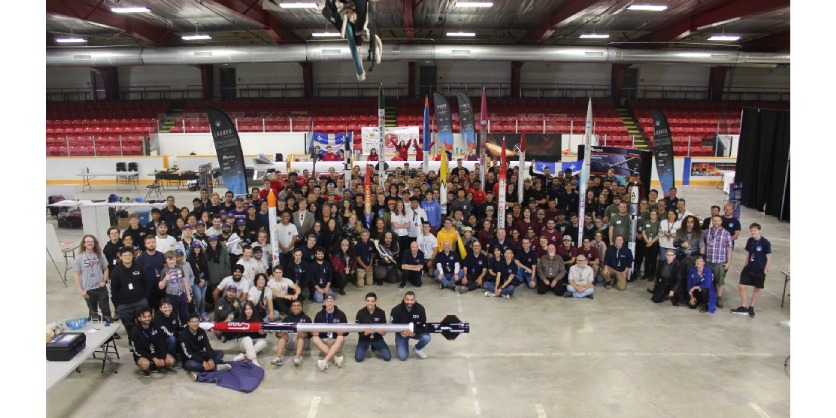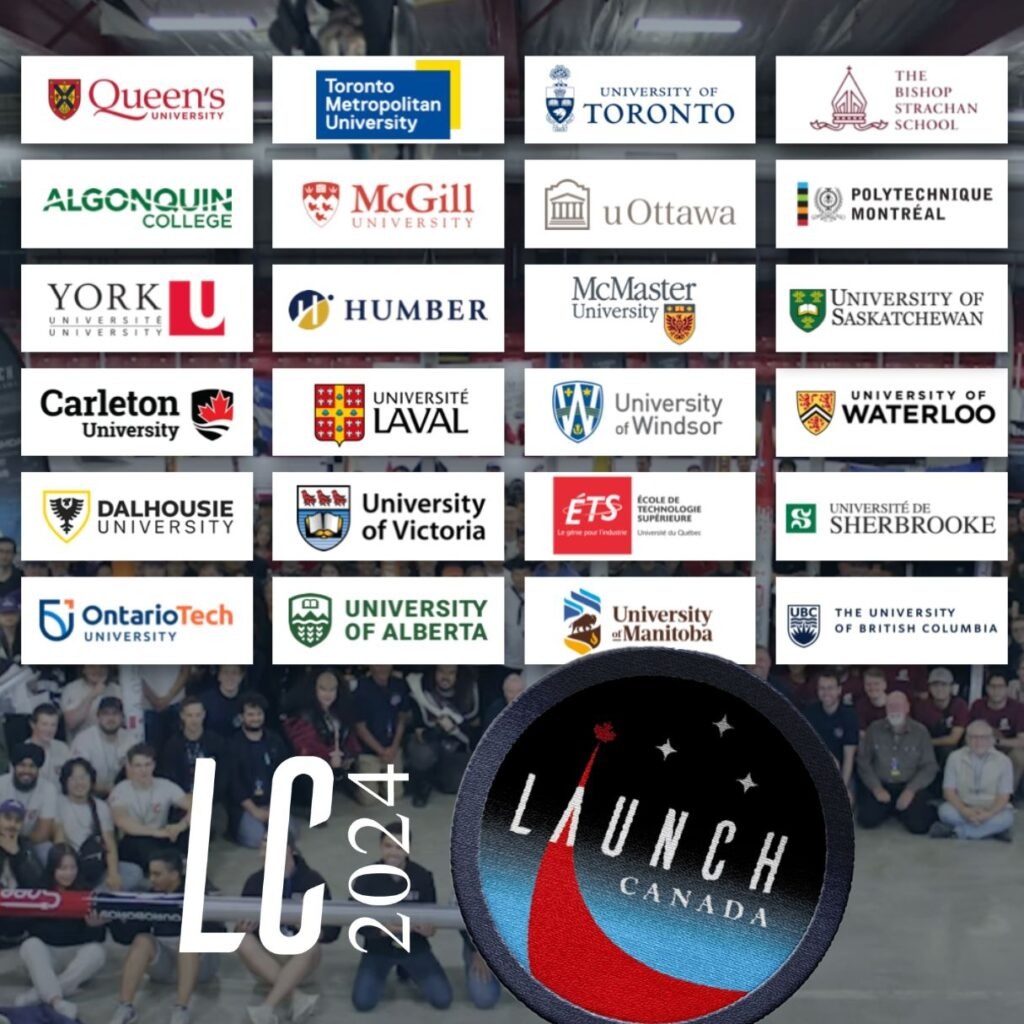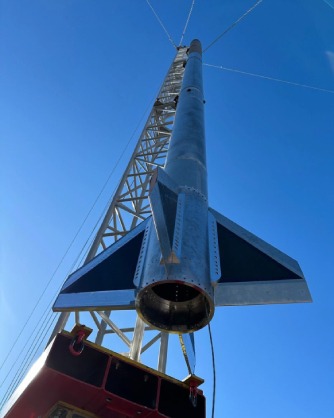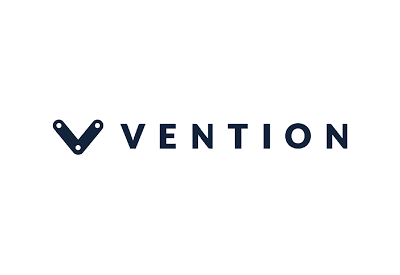Launch Canada Expands Rocketry Competition
July 24, 2024

The Launch Canada student rocketry competition, now independent from the Anangokaa (formerly Stardust) Festival, is largely staying the course as it moves towards its 2024 event. The major change to the competition: further expansion, as Launch Canada begins to incorporate local high school students into the competition.
SpaceQ spoke with Launch Canada’s founder and President, Adam Trumpour on the competition and what’s happening this year.
Launch Canada Competition 2024
Trumpour described the Launch Canada Competition 2024 as “Canada’s premier advanced rocket engineering competition.” Student rocketry clubs from universities and colleges across Canada come together every year to compete in the challenge across three different divisions: basic rockets, advanced rockets, and technical projects.
By and large, the divisions and competition have remained unchanged; Trumpour said that “the basic format of the competition is really the same as last year.” Basic rockets are comparatively simple, with the teams primarily using off-the-shelf parts, allowing comparative newcomers to rocketry to compete and excel. Advanced rockets, meanwhile, have the teams building their own more-complex rockets: like multi-stage rockets, hybrid rockets, and liquid-propellant rockets. The technical project category involves a wide variety of different rocket-related technologies: including static engine firing, communications hardware, and thrust vectoring.
Teams in the advanced and technical categories can end up crossing over, as they demonstrate technology used in their advanced rocket project, or technology they may use in upcoming projects.
Teams attend a multi-day conference prior to the launch event, where they work with Launch Canada volunteers to prove their rockets are ready and safe, present their plans to volunteers and the other student teams, as well as attend lectures and presentations by space sector professionals. After that, they go to the launch site, and make their attempts at launch over the course of the following days. Not all of them succeed and have nominal launches, but teams can and do come back for another go next year. After the launches are over, both the rocket launches and presentations are judged by Launch Canada volunteers to determine the winners in each division.
Trumpour said that there were about 26 team projects this year: 14 “basic launch” projects, 7 “advanced launch” projects, and 5 technology projects.

Return to Timmins and Mattagami
While the location has changed from year to year over the last few years, Trumpour said that this year’s event would be located in the same place as in 2023: near Timmins, Ontario and the Mattagami First Nation. Trumpour said that the move from Cochrane to Timmins was a big success, and a necessary change considering that they had “basically doubled the teams from what we had in 2022.” “Everything really worked well”, he said, and so they decided to return back to the same city and even the same site, which ensures “we don’t have to go and carve Cape Canaveral out of the forest again.”
As they’re returning to Timmins and Mattagami First Nation, Trumpour said that they’re also looking to reinforce their connection with these local communities. He said he was “really excited” about how “we’ve got some really strong partnerships with the city of Timmins and with the Mattagami First Nation,” and anticipates that these relationships will help ensure that members of the communities are comfortable with the competition taking place nearby. Part of that, he said, was growing the conference piece of the event and incorporating public outreach initiatives. This includes model-rocket building events for local youth.
High School Rocket-in-a-Box
One significant new community-focused element is the inclusion of high school students to the event. In addition to the current university rocket teams, Trumpour said, they’ll be inviting high school students from the area to participate. The goal is to have them put together and launch something that is “a little bit more complex than just a little model rocket.”
So, Trumpour said, they collaborated with Science Timmins and the Mattagami First Nation to create a “rocket-in-a-box program.” They’re creating a standardized high-powered rocket kit that they’re making available to high school students in and around Timmins and Mattagami First Nation, and are getting a number of volunteers to come up to Timmins to assist the high school students with their launch kits before the event. Then, he said, “they’ll be able to bring their rockets out to the main Launch Canada competition, and put all their work to the test and actually fly them.” He said that they’ve been working to arrange transportation for the students.
If all goes well, the high school component of the event may expand. Trumpour said that “we’re starting on a trial basis to see how this all goes [and]…learn ourselves about how to do this. If all goes well, we’re looking at trying to expand this.” with a focus on building “a program that is going to be scalable and accessible.”
Indigenous Students and Rocketry

The other point that Trumpour emphasized was a focus on the involvement of Indigenous students and communities. Trumpour did not go into specifics on the split with the Anangokaa festival, discussed in previous SpaceQ coverage. He only said that the organizations were moving in different directions, and that the differences in “considerations and constraints” for the events meant that they were not able to operate together this year. In particular, Launch Canada has tight timing constraints to ensure that the event did not conflict with students’ schedules, creating conflicts over timing that ultimately could not be overcome.
Nevertheless, Trumpour said that helping developing rocketry skills and knowledge among Indigenous students is a key goal for the organization. He pointed to the first predominantly Indigenous team, UBC’s Thunderbird Aerospace, as a key example. The team is taking part in the more-demanding advanced project category, and are working on a liquid-propelled rocket. He said it was a “hugely ambitious project,” but that they’ve been “really persistent keeping at it this year,” and that he’s looking forward to seeing them reveal it at the event.
Aside from that, MDA Space (one of the event’s sponsors) is also assisting with Indigenous student rocketry. Trumpour said that MDA Space has made a pool of funding available for teams, like Thunderbird Aerospace, that contain a significant Indigenous component. Trumpour couldn’t get into specifics, but said that “MDA is going through the process of evaluating the different applications…we should see at least a few teams getting some financial support as a result of that.”
Trumpour is hoping that, in future, they’ll be able to provide transportation and other support to other teams as well–particularly teams that face long travel distances or who enjoy less institutional support.
Other prominent sponsors include Astros, NordSpace, and Pratt and Whitney Canada, which is the lead industry sponsor this year. The event begins on August 17th, and Launch Canada will be sharing details soon on where and how it can be streamed by viewers at home.
Related Story
The Canadian Space Economy Could be Worth $40 Billion by 2040
According to a new report by Deloitte Canada, the country needs a bold public policy strategy to strengthen its position in the space sector—a strategic imperative for a more thriving economy.


